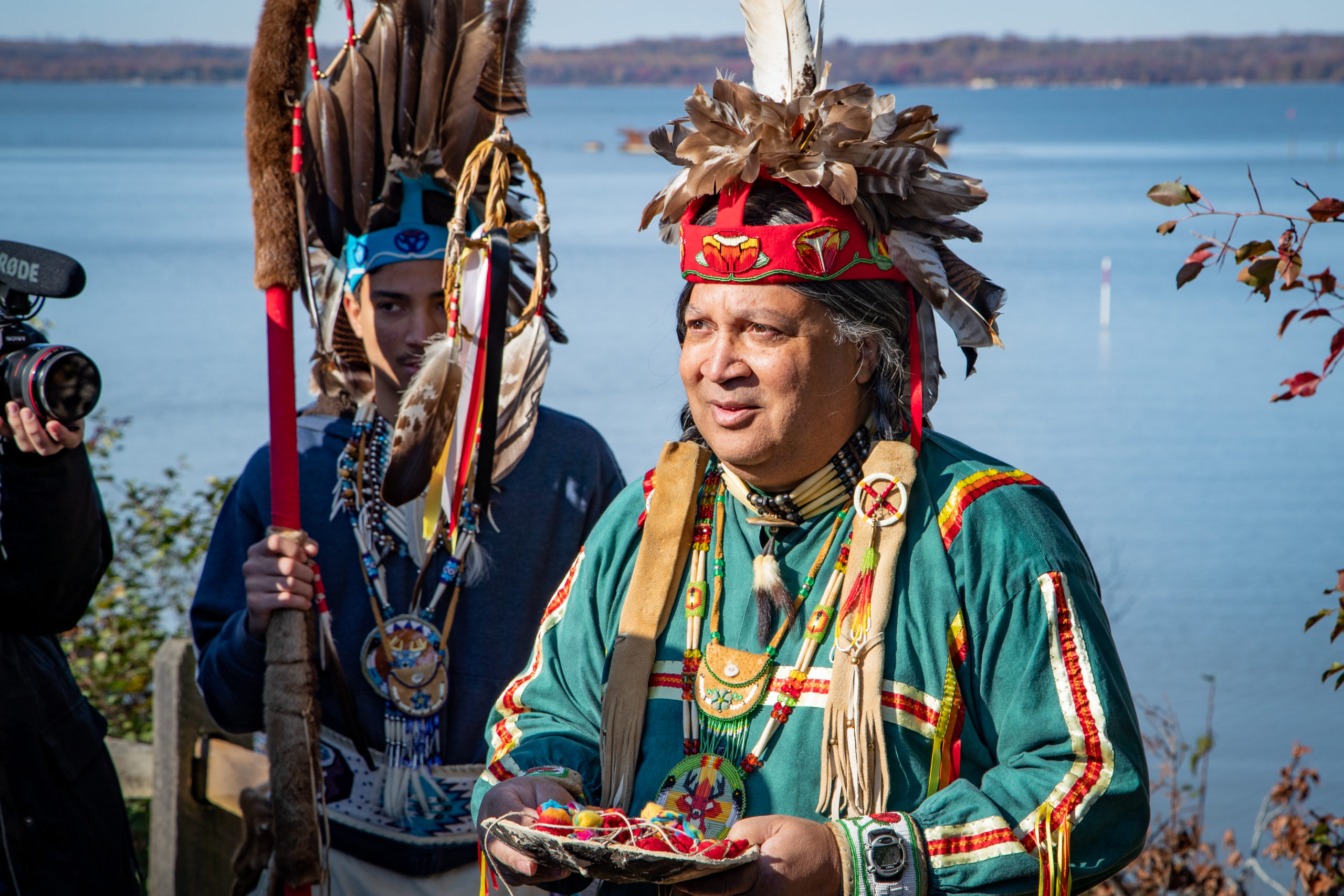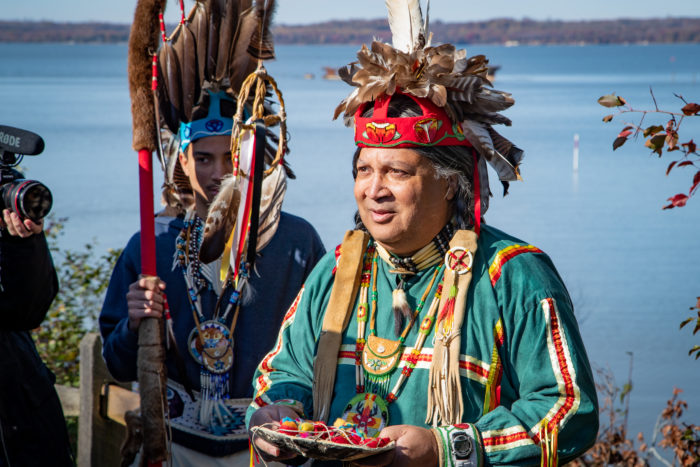
Native American Heritage Month

Members of the Piscataway Conoy Tribe at the designation of Mallows Bay-Potomac River National Marine Sanctuary in 2019. Photo credit: Matt McIntosh
Each November, we celebrate Native American Heritage Month, which offers the opportunity to reflect on the wisdom shared by Indigenous leaders and keepers of traditional knowledge.
At Capitol Hill Ocean Week 2021, which focused on Justice, Equity, Diversity, and Inclusion: Sustaining Our Ocean and Great Lakes, we were honored to be joined by Indigenous leaders from around the National Marine Sanctuary System. Native American and Indigenous leaders opened the conference with a circle of connection, where each gave a traditional blessing and tribute to the lands and waters that sustain their communities. Throughout the sessions, speakers emphasized that Indigenous knowledge and wisdom is essential for strengthening our understanding of the planet and improving environmental decision-making to protect our ocean and coasts.
As this month comes to a close, we would like to revisit some of the wisdom that was shared by these leaders during Capitol Hill Ocean Week, and reaffirm our commitment to listening to, learning from, and uplifting the voices of these communities.
“[Indigenous elders] say that this is a time to focus on Mother Earth, that this generation will decide whether or not human beings are going to survive. Mother Earth has survived billions of years, she’s going to survive billions more- it’s a question of whether or not we’re going to survive, and the answers are going to be provided by one’s heart, not by the mind…Native people look at things holistically, [but] western science talks about pieces of creation and studies them in hopes of understanding what’s happening to creation, whereas native people we look at the whole…scientists need to understand that we have our ways that need to be inputted, not incorporated, into western science, but partnered with western science.” –Ilarion ‘Kuuyux’ Merculieff, Founder and President, Global Center for Indigenous Leadership and Lifeways, National Marine Sanctuary Foundation Board member
“When you do have policies that impact Indigenous peoples, it is critical that we are all there at the table, having our opportunity to be part of the deliberations and the decision-making at the early stages, and ensuring that the Indigenous peoples have the same voice, and vote, and ability to agree and consent before any of these policies are enacted…or else these injustices will continue and the voices of Indigenous peoples will not be heard.”- Cheryl Andrews-Maltais, Chairwoman, Wampanoag Tribe of Gay Head/Aquinnah
“Current science practice paints a really wonderful two-dimensional picture, mostly because it is based on a few hundred years of data points. I think there’s a much more rich database out there to draw on and that’s traditional ecological knowledge, which has thousands of years of data and observation that would be able to help scientists present a more three-dimensional picture of both the climate crisis and the possible climate solutions. From an Indigenous knowledge system, you also have this multi-disciplinary approach to a problem, which makes the solutions a lot more rich…If we are looking at both practice and participation that is both people and culturally centered, I think that we get a long way toward what we’re all hoping for our oceans and Great Lakes.” – Michael E. Roberts, President and CEO, First Nations Development Institute, Tlingit Tribe member
“The ocean-going and seafaring ways of our ancestors have been reclaimed by our ability to reconnect with our heritage and the ability to rediscover our culture and community, through the ocean and through these traditions that we’ve brought back. It’s necessary for us to join forces with other agencies such as NOAA and other agencies that are interested in protecting and conserving these waters in order to help better manage and in order to help tell the stories of our people…the deep connection with our ocean and our heritage and all living things is our responsibility as a tribe and it’s our obligation that we have from our ancestors to share this with people, so that people will understand the importance of our struggles and our commitment to conservation.” – Violet Sage Walker, Chairwoman, Northern Chumash Tribal Council
“The Piscataway Conoy are pleased to be a small part of this greater good, and we share the same philosophy, as we speak for the waters and the land that the Creator has placed us upon. We ask the Creator to help guide us down the path that we have chosen, so that we may do so with honesty, dignity, and respect. We also would like to thank Mother Earth for all she has given us, and for her to remind us to never take more than we need, and to always remind us to always give back more than we take.” – Francis Gray, Tribal Chairman of the Piscataway Conoy Tribe
“Makah people have lived in this cape area since time immemorial, and our life has always been directly connected to the surrounding waters. Olympic Coast National Marine Sanctuary was established in 1994 and lies just outside of our five traditional villages…Land and sea are closely tied in Makah culture…our lands and waters have been managed and protected by Makahs for centuries, and now the tribe works in collaboration with the Olympic Coast National Marine Sanctuary to enhance resource protection. By working together, the tribe and the sanctuary, along with other partners, will ensure that these waters and coastlines remain rich, vibrant, and productive for generations to come.”- Janine Ledford, Executive Director and Makah Tribal Historic Preservation Officer, Makah Cultural and Research Center
